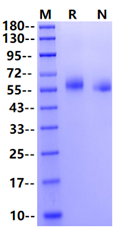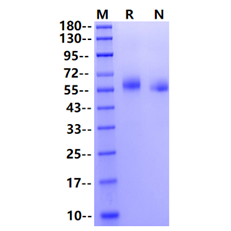1μg (R: reducing conditions, N: non-reducing conditions).
Product Details
Product Details
Product Specification
| Species | Mouse |
| Antigen | BTNL2 |
| Synonyms | rMuBTNL2, Butyrophilin-like protein 2 |
| Accession | O70355 |
| Amino Acid Sequence | Lys24-Trp454, with C-terminal 8*His KHPDDFRVVGPNLPILAKVGEDALLTCQLLPKRTTAHMEVRWYRSDPDMPVIMYRDGAEVTGLPMEGYGGRAEWMEDSTEEGSVALKIRQVQPSDDGQYWCRFQEGDYWRETSVLLQVAALGSSPNIHVEGLGEGEVQLVCTSRGWFPEPEVHWEGIWGEKLMSFSENHVPGEDGLFYVEDTLMVRNDSVETISCFIYSHGLRETQEATIALSERLQTELASVSVIGHSQPSPVQVGENIELTCHLSPQTDAQNLEVRWLRSRYYPAVHVYANGTHVAGEQMVEYKGRTSLVTDAIHEGKLTLQIHNARTSDEGQYRCLFGKDGVYQEARVDVQVMAVGSTPRITREVLKDGGMQLRCTSDGWFPRPHVQWRDRDGKTMPSFSEAFQQGSQELFQVETLLLVTNGSMVNVTCSISLPLGQEKTARFPLSGWGGGSHHHHHHHH |
| Expression System | HEK293 |
| Molecular Weight | 55-65kDa |
| Purity | >95% by SDS-PAGE |
| Endotoxin | <0.1EU/μg |
| Conjugation | Unconjugated |
| Tag | His Tag |
| Physical Appearance | Lyophilized Powder |
| Storage Buffer | PBS, pH7.4 |
| Reconstitution | Reconstitute at 0.1-1 mg/ml according to the size in ultrapure water after rapid centrifugation. |
| Stability & Storage | · 12 months from date of receipt, lyophilized powder stored at -20 to -80℃. · 3 months, -20 to -80℃ under sterile conditions after reconstitution. · 1 week, 2 to 8℃ under sterile conditions after reconstitution. · Please avoid repeated freeze-thaw cycles. |
| Reference | 1. Arnett, H.A. et al. (2007) J. Immunol. 178:1523. 2. Arnett, H.A. et al. (2009) Cytokine 46:370. 3. Smith, I.A. et al. (2010) J. Immunol. 184:3514. 4. Nguyen, T. et al. (2006) J. Immunol. 176:7354. |
Background
Butyrophilin-like 2 (BTNL2) is a member of the BTN/MOG Ig-superfamily and functions as a negative regulator of immune cell activation. BTNL2 is expressed in epithelial cells of the small intestine, colonic dendritic cells, and in cells of the lymph node. BTNL2 expression is upregulated in T cells following activation, a characteristic BTNL2 shares with the homologous B7 family of co-stimulatory molecules. BTNL2 negatively regulates T cells by inhibiting proliferation and inflammatory cytokine secretion. It also increases the expression of FoxP3 in T cells to promote regulatory T cell development. Single nucleotide polymorphisms in BTNL2 are associated with a risk for sporadic prostate cancer, rheumatoid arthritis, sarcoidosis, ulcerative colitis, and other inflammatory diseases.
Picture
Picture
SDS-PAGE



